21 ESSENTIAL Tips for Flying with a Baby or Toddler
Flying with a baby or toddler and afraid everyone on the plane will hate you? You are not alone. When talking to new parents about traveling with children, the most common worry I hear is being “that parent” on the airplane with the screaming baby. As someone who has been that mom, despite all my preparation and attempts to soothe my child, I understand. Follow this list of the 21 best tips for a smooth flight with babies and toddlers!
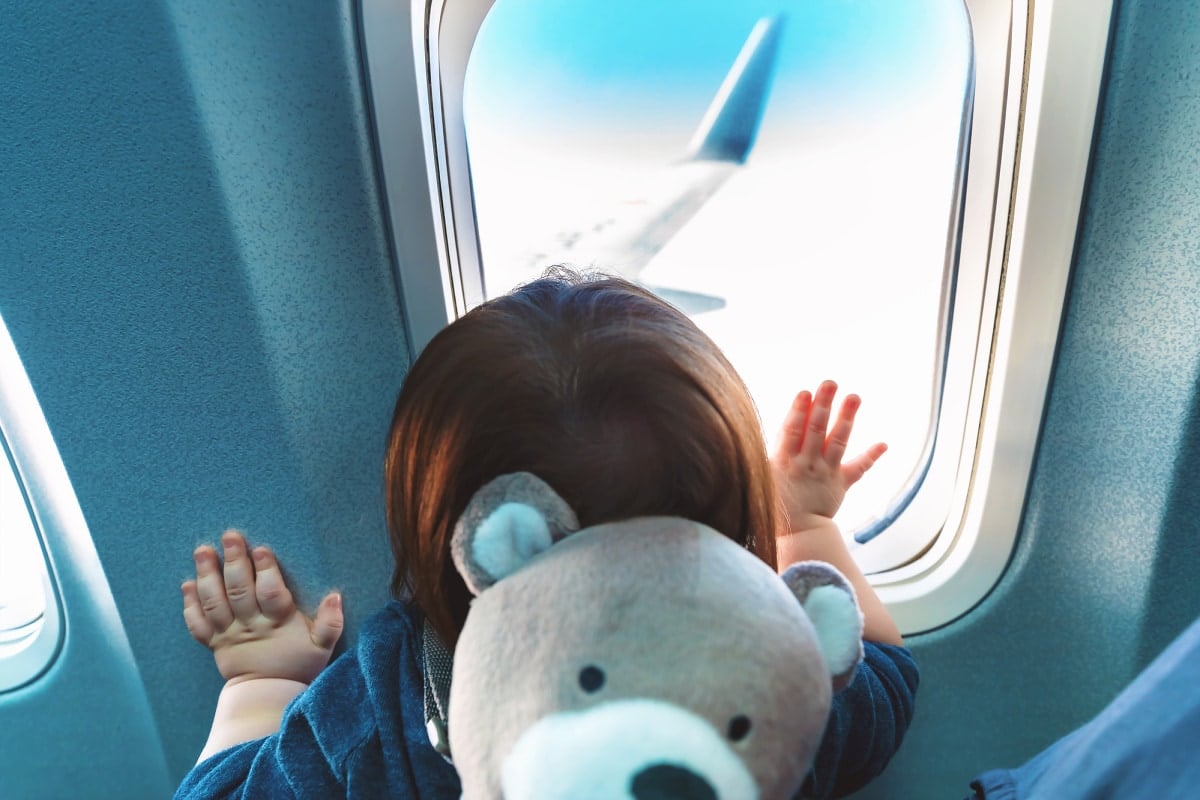
This website sometimes receives compensation, hosted travel, or products related to blog posts. This article may include affiliate links at no extra cost to consumers. As an Amazon Associate, we earn money from qualifying purchases.
1. Book a direct flight or one with a longer layover.
As the parent of a baby or young child, it is imperative to keep the number of connecting flights to a minimum. Landing is typically what puts air pressure on a baby’s ears, causing the pain that leads to screaming on airplanes. Plus, less time spent in transit means fewer chances for a mid-flight tantrum.
If you must book a flight with a connection, then schedule extra time on the ground between flights. Two to three hours is probably ideal unless your flight is delayed quite a bit. You don’t want to be running through the airport with a baby, diaper bag, car seat, and other travel paraphernalia.
Layovers are the perfect time for young families to grab some non-airplane food, change a dirty diaper, and most important when flying with a toddler, let your child run free for a while to burn off energy!
For long-haul flights, you might even consider booking a connection with an 8-hour+ overnight layover. This will allow your family to get some rest at a hotel before continuing on to your final destination.
I suggest avoiding red-eye flights if at all possible. This will cut down on jet lag for the whole family.
For your first time flying with a baby, it’s best to book a short flight. This gives you a chance to put some of these top tips into practice and will build confidence before you tackle the long flights required for international travel.
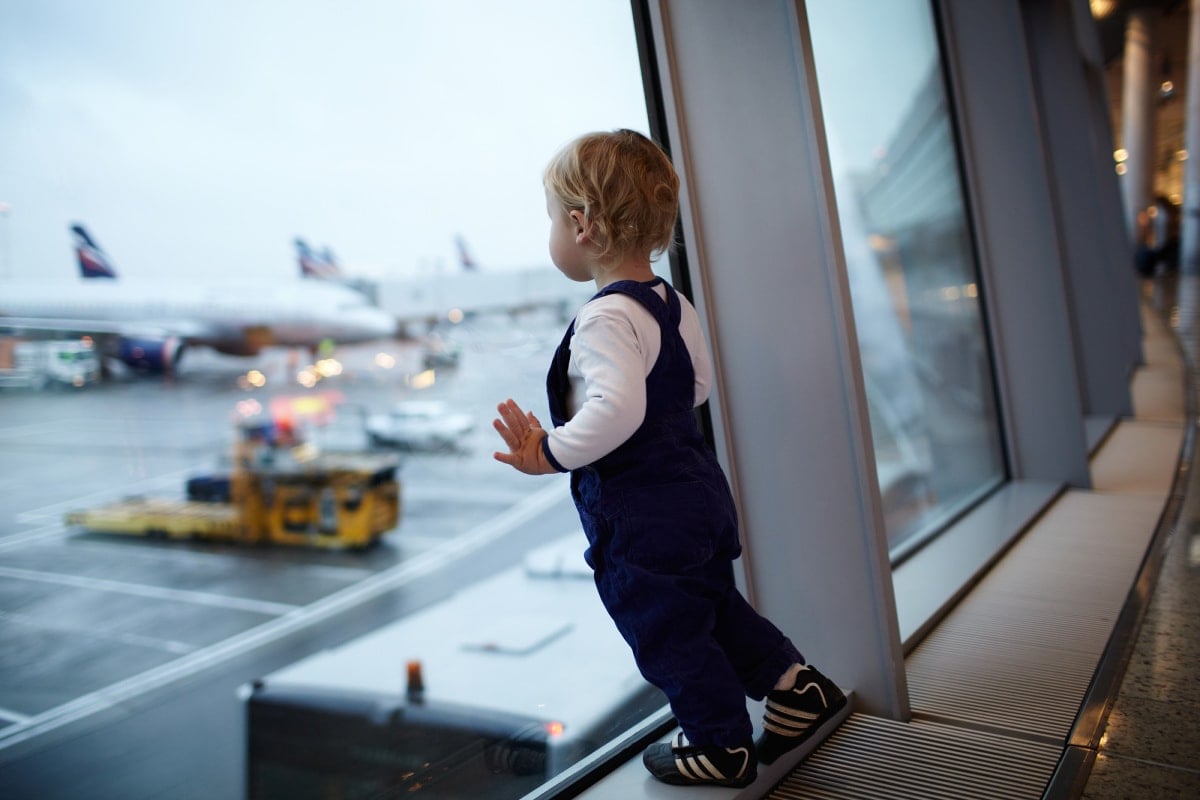
2. Visit the airport restroom before your flight.
Ideally, you want to board the plane with a dry diapered child. Therefore, be sure to hit up the airport bathroom one last time for a quick diaper change before heading down the jetway.
While you’re there, you may want to double up on the diaper cream and put your baby into not one, but two diapers for extra leak protection.
If traveling with a toddler who’s potty training, then of course you’ll want one last potty break, too. A pre-plane bathroom visit means one less trip to the tiny airplane lavatory. (Thankfully, most airplanes do come equipped with a changing table.)
This leads to less work in the air for mom or dad and less inconvenience for those seated nearby. Plus, you never know how long it will be until the “keep seat belt fastened sign” will be illuminated. It’s better to be safe than sorry (and stinky)!
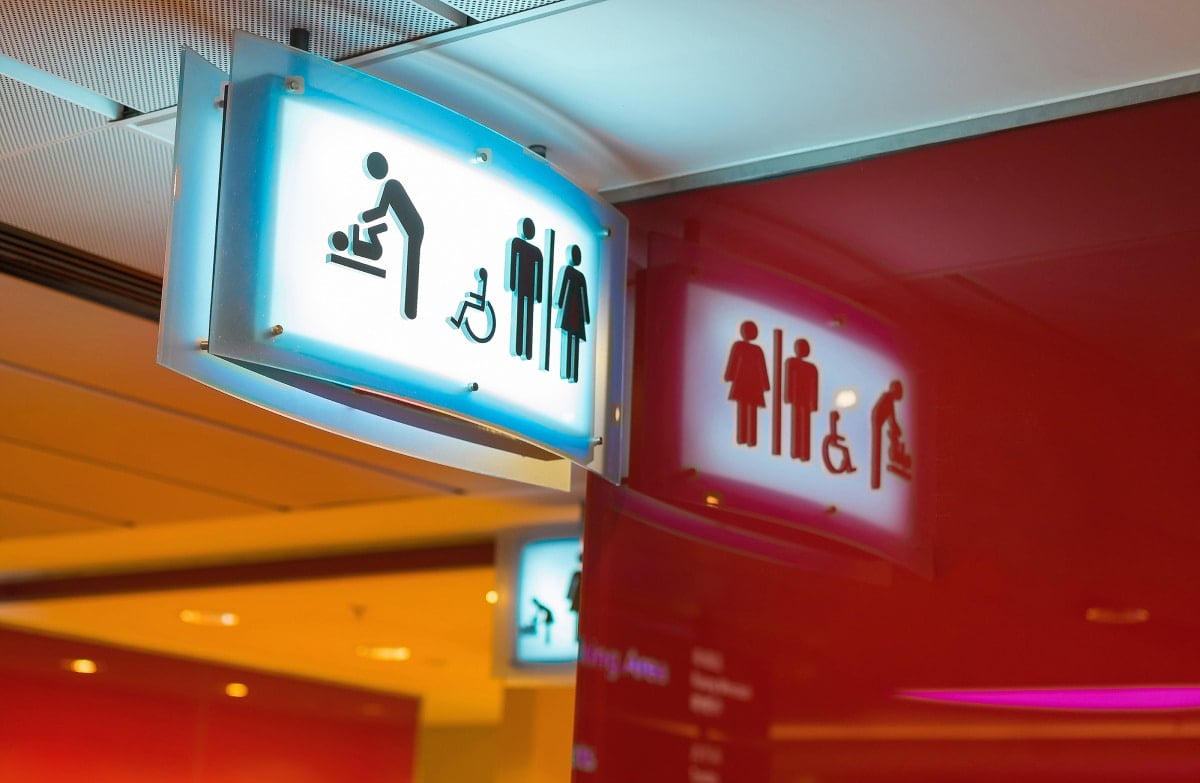
3. Take advantage of pre-boarding.
You may think you should skip the pre-board to ensure spending as little time as possible on the airplane with your child. Think again!
Getting situated on board a flight takes more time with a young child. Flying with a toddler or baby is stressful enough without having passengers behind you sighing as you struggle to buckle in your little darling.
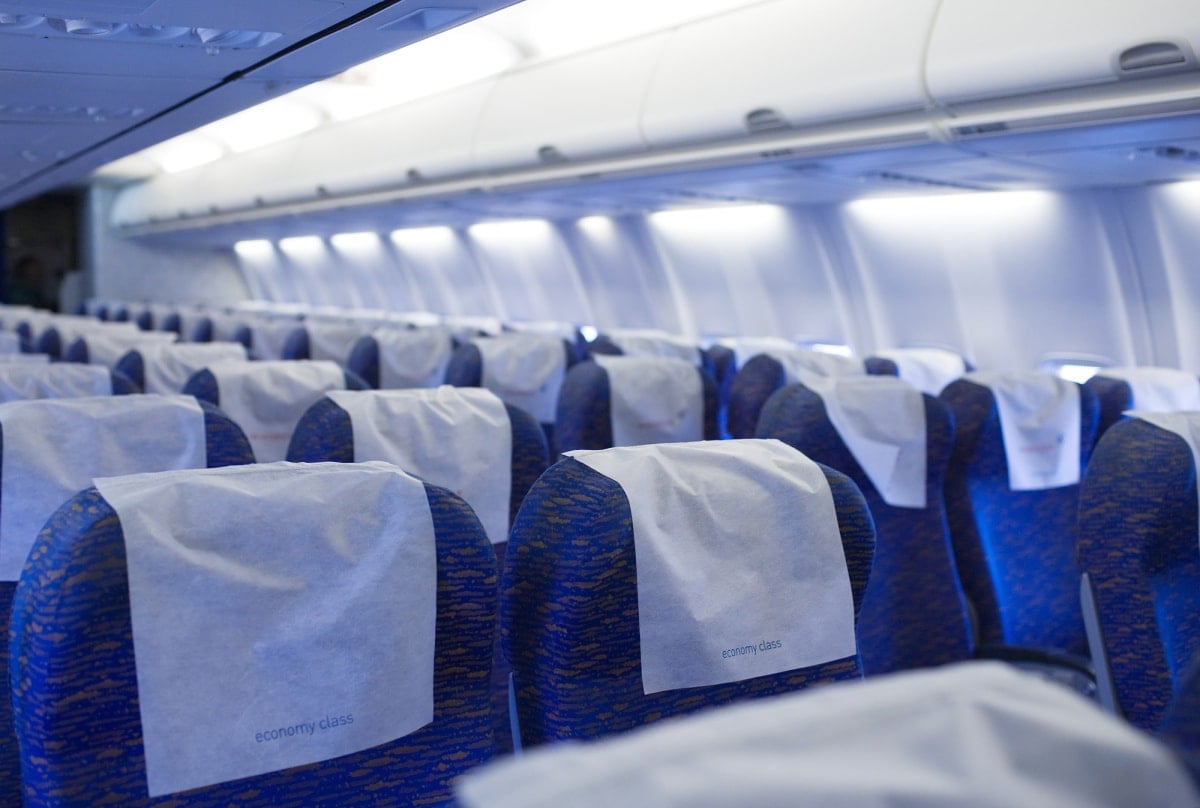
4. Buy a separate airplane seat for your child.
I recommend you book a separate seat for your child, even though lap children under age 2 typically fly free. Not only is providing a baby or toddler with their own seat the safer option, but also it gives your family more room to spread out and relax on the plane. The extra seat will especially come in handy during a long haul flight.
Keep in mind, passengers are not allowed to keep a child in a wearable baby carrier during take-off and landing, for the safety’s sake of both the baby and the adult.
Besides, do you really think it’s a good idea to fly with a lap infant or lap toddler? Snuggling with your baby is fun, but not for hours and hours in a confined space. It makes eating meals in the air especially difficult.
Plus, an active toddler will not want to sit on your lap for the whole flight. Trust me.
Use a baby or toddler car seat or lightweight CARES harness to keep your child safely strapped into a separate seat on the airplane. If you have difficulty buckling the car seat into the airplane, then ask flight attendants for assistance. This is well within the training and expectations of the cabin crew.
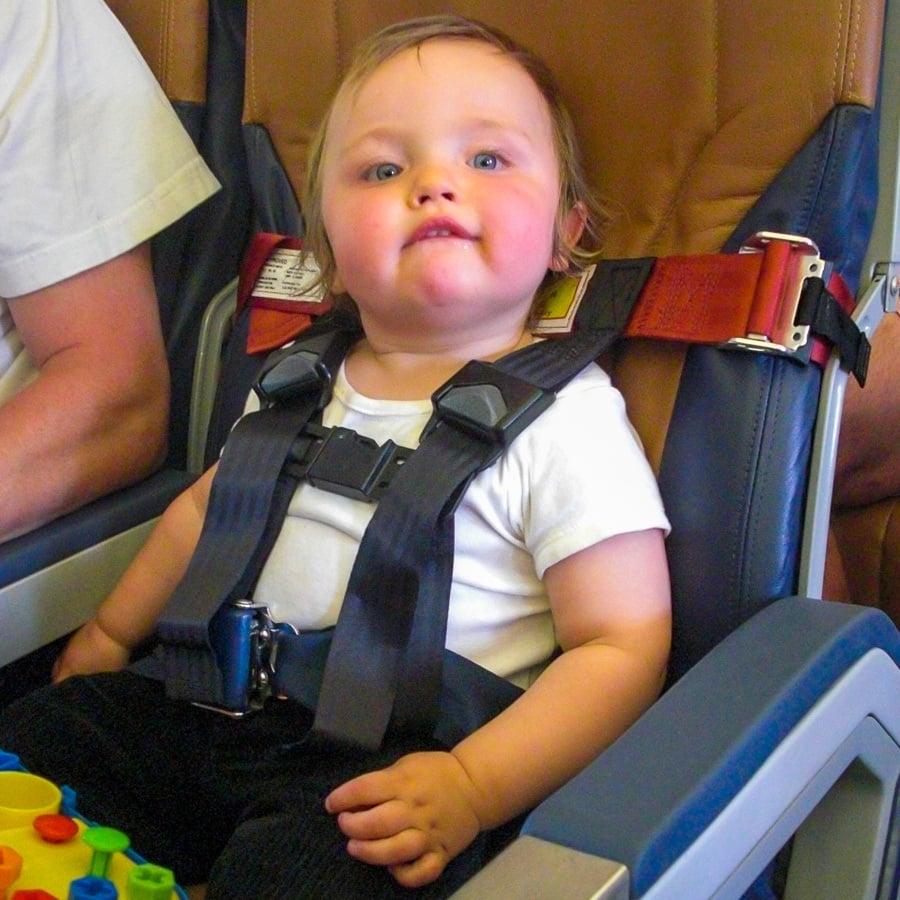
5. Follow FAA and American Academy of Pediatrics recommendations.
If you boarded a plane and were informed that your safety belt was broken, I’d bet you’d balk. Why put your child at risk?
FAA Guidelines
When it comes to flying with babies and toddlers listen to the advice of the Federal Aviation Administration. The FAA website says, “Did you know that the safest place for your child on an airplane is in a government-approved child safety restraint system (CRS) or device, not on your lap? Your arms aren’t capable of holding your child securely, especially during unexpected turbulence.”
“Did know that the safest place for your child on an airplane is in a government-approved child safety restraint system (CRS) or device, not on your lap?”
Federal aviation administration
They continue, “The Federal Aviation Administration (FAA) strongly urges you to secure your child in a CRS or device for the duration of your flight. It’s the smart and right thing to do so that everyone in your family arrives safely at your destination.”
American Academy of Pediatrics
The American Academy of Pediatrics agrees that securely buckled in a seat is the safest way for every passenger to fly.
“The safest possible thing is for everybody to be restrained,” said Ben Hoffman, president-elect of the American Academy of Pediatrics in this Wall Street Journal article about the dangers of lap-babies on airplanes (in which I am quoted!).
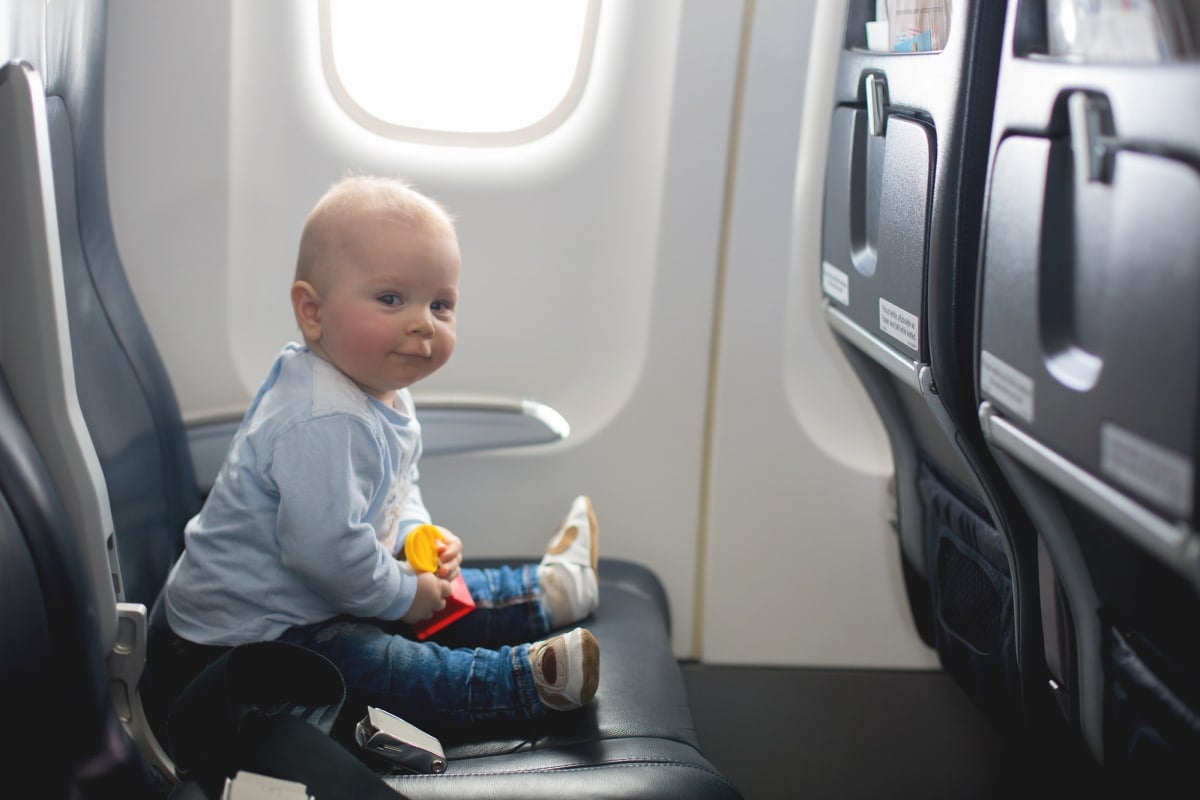
6. Save money on flying with a baby or toddler.
I know it’s more expensive to book a seat for your baby or toddler and this may limit your travel capabilities. For good reason, it’s important to find ways to save money when traveling with kids.
Air travel tickets can be one of the most expensive parts of travel. Why pay full fare? Thankfully, there are a few fabulous websites that can help you save money on your next flight.
Aggregate travel websites, like Kayak or CheapOAir, provide an easy way to check pricing for multiple travel providers at one time. Keep in mind that some airlines, like Southwest Airlines, may not be included on these search sites. You can often bundle your travel options by booking flights, hotel, and rental car all together to take advantage of discounts.
My favorite way to save on air travel is Going (formerly Scott’s Cheap Flights). They send email alerts when prices drop to destinations from your selected airports. It’s free to do, too. For even more savings, enroll in their Premium Membership. Believe me, you’ll save more by booking one discounted flight than you’ll spend for an entire year of Premium Membership. ($49/year in June 2023.)
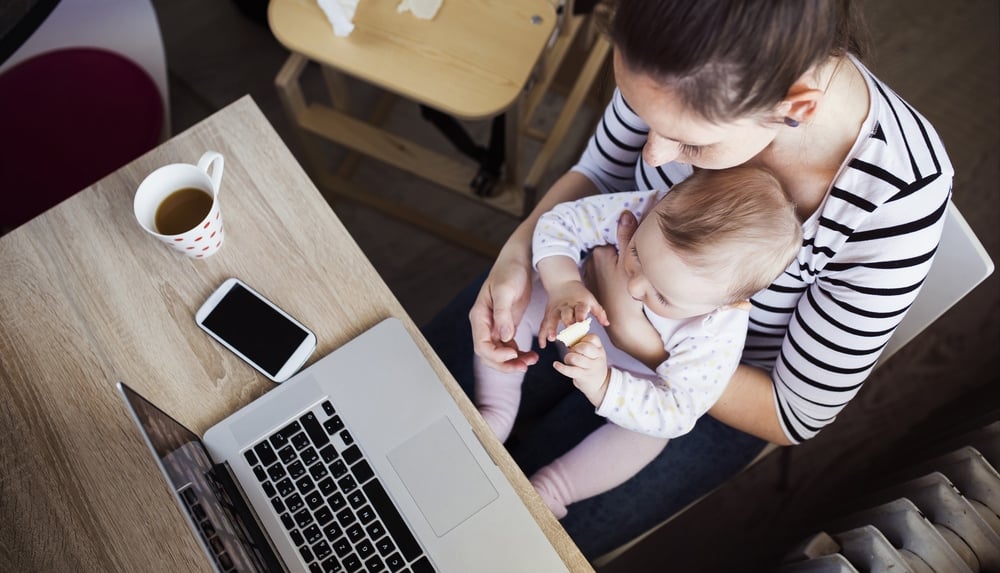
7. Gate check baby gear.
At no additional charge, most airlines allow parents and caregivers to gate check bulky baby gear like strollers and car seats. Simply request gate check tags from the gate agent at the airport. This does not count against your carry-on baggage or luggage allowance in the United States, either.
Attach one tag to each item and deposit it at the bottom of the jetway. Be sure to fold strollers before boarding.
Gate checked items will typically be waiting for you in the same spot at your destination when you disembark. Sometimes, though, they must be retrieved from baggage claim. Check with your airline before your flight regarding their gate check policy and baggage allowance policy, especially for travel in European countries or other international travel.
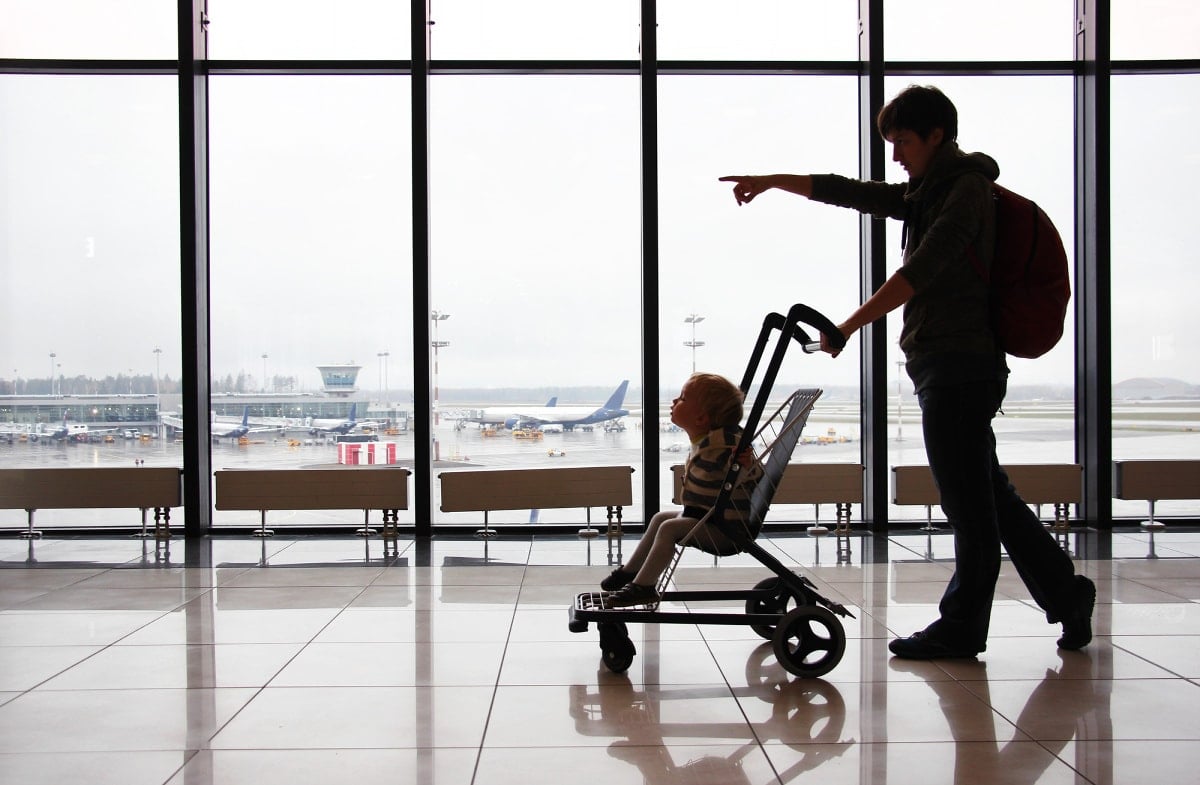
8. Rent baby equipment for travel.
If you choose to use a CARES safety harness, you will still need an approved car seat for use in motor vehicles during your vacation. To lighten your load during airplane travel and avoid baggage fees, consider renting baby travel gear. You can have a travel stroller, crib, car seat, high chair, booster seats, and more delivered to your destination.
These items can be brought to you wherever is most convenient — the airport, hotel, or grandma’s house. This service is available in locations around the world for traveling families.
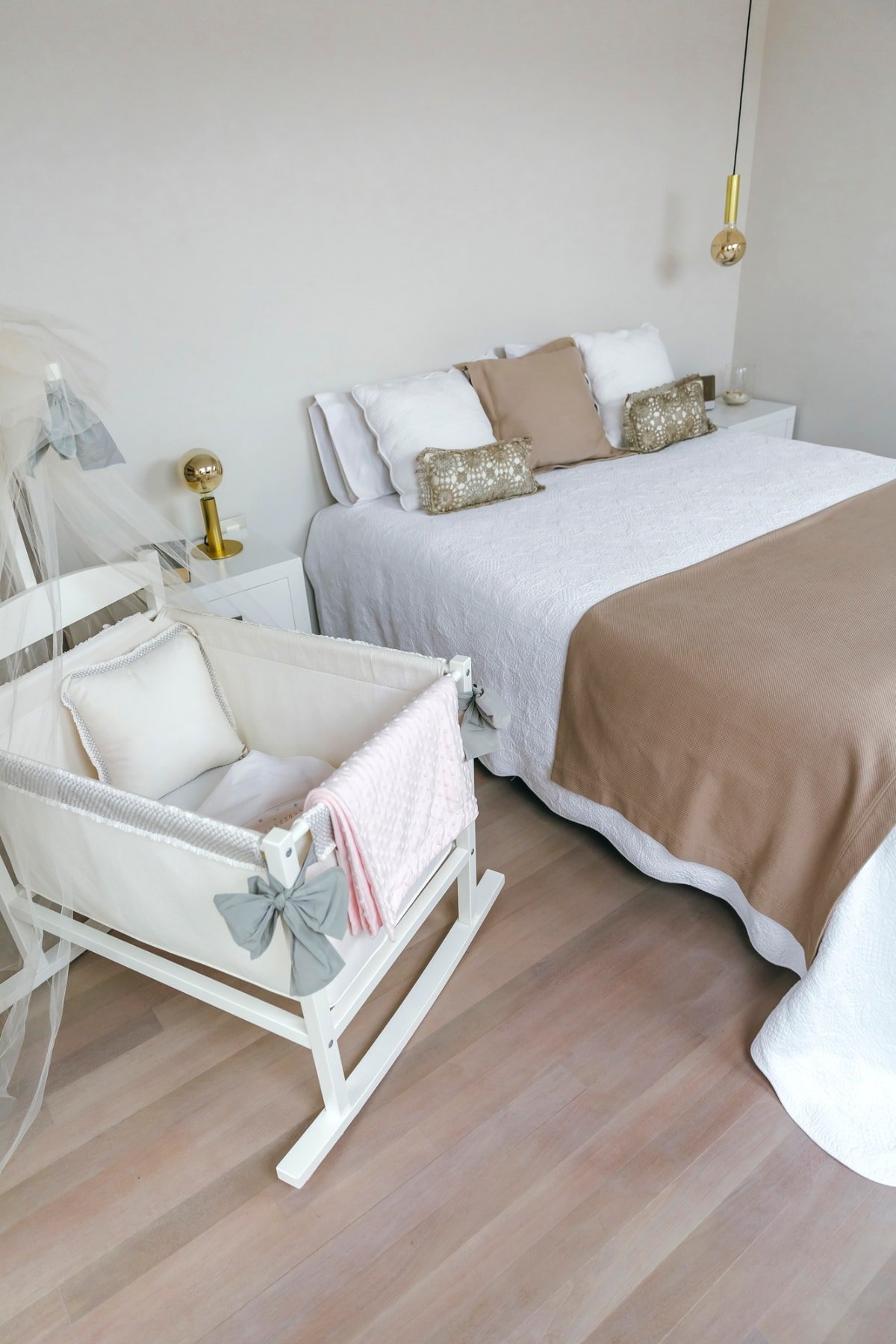
9. Keep your baby or toddler buckled.
Buckled snugly into a car seat or other approved restraint is the safest place for a baby or toddler on an airplane, especially in case of unexpected turbulence. Your child is used to being secured in their own car seat the entire time during trips to the store or zoo. He or she knows to stay in this “special seat,” and if you’re lucky, your child doesn’t question this.
Of course, the time may come when you need to unbuckle your youngster for a diaper change, potty break or to stretch those little legs — especially during a long flight.
Once your child tastes sweet freedom, though, you might struggle to get him or her back into the seat. An infant will often want to stay in your arms for the whole flight. Meanwhile, a newly walking toddler may want to run up and down the aisle nonstop. Therefore, it’s best to stay securely fastened as long as reasonable.
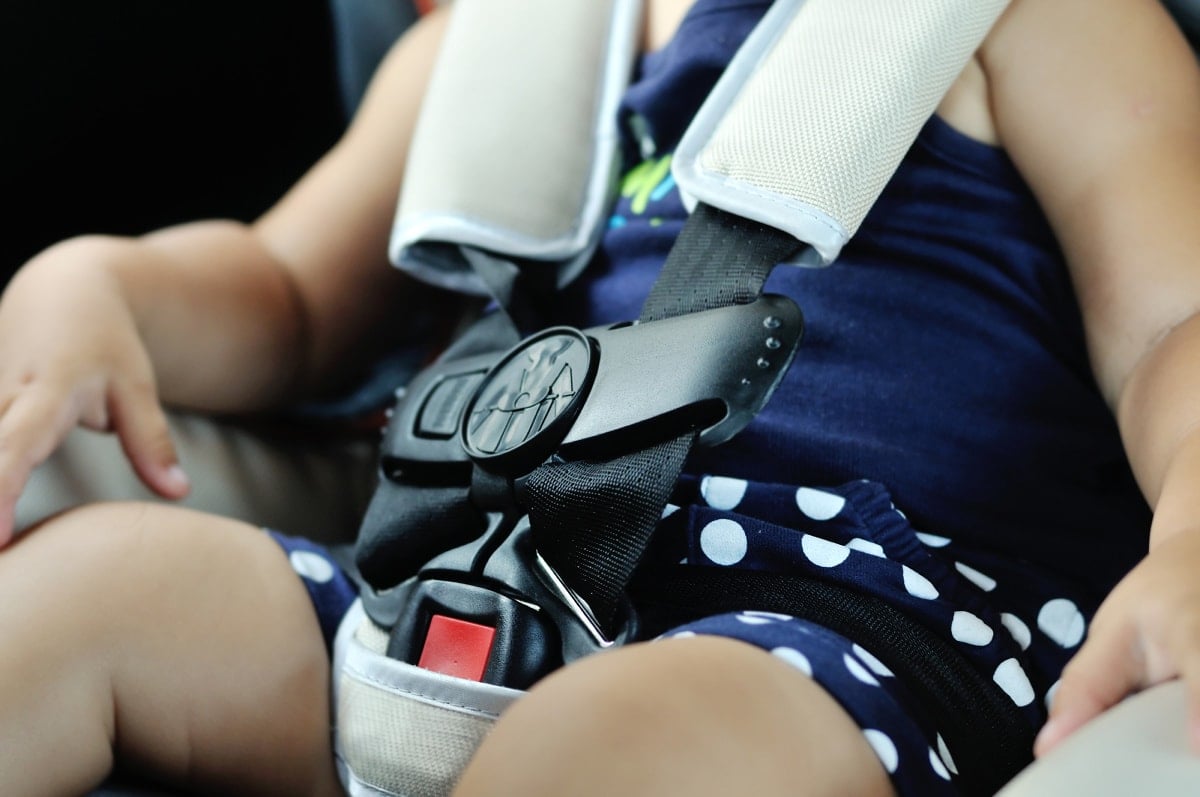
10. Bring double the baby necessities.
Bring twice as much formula, diapers, bottles, baby food, and healthy snacks on the plane as you think you will need. If your plane becomes severely delayed or canceled, you will thank me.
The last thing you want to deal with is a hungry, thirsty, dirty-diapered baby when flying. This is especially true if you get stuck on the tarmac, circling above a storm, or you must bed down in a hotel room for an unexpected overnight.
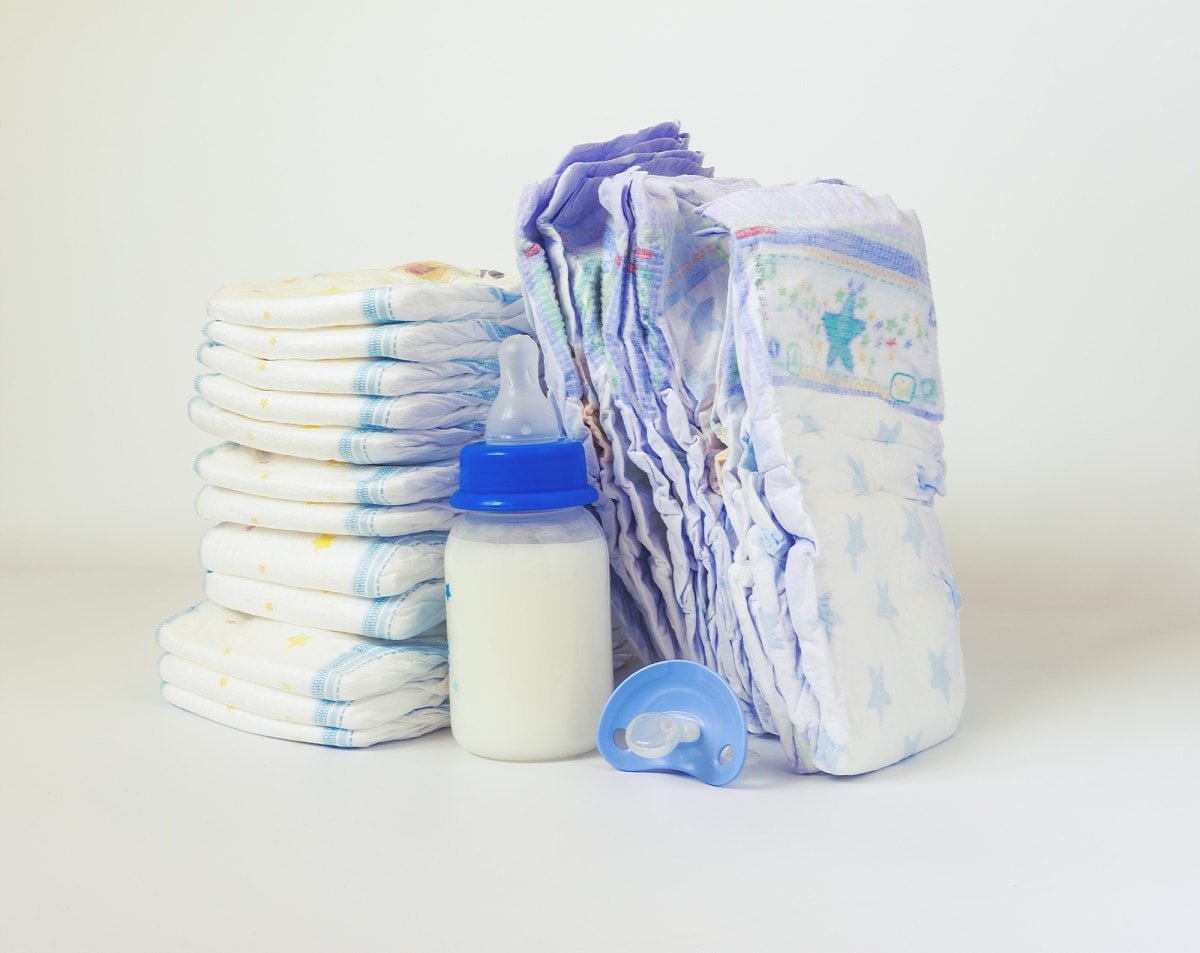
11. Dress in comfortable layers.
You may be tempted to doll up your baby in that adorable outfit from your mother-in-law for your flight. But think comfort and convenience first. Choose attire that is cozy and easy to change.
Layers are a must when going from a snowy locale to the sunny Tropics, of course. But layers also help with drastic changes in temperature aboard the plane.
If you get stuck on the tarmac you might be boiling hot, pointing that tiny overhead fan at you and your child. Then, once airborne you might be shivering in your seat.
Wearing layers is also helpful for breastfeeding moms. I suggest wearing a wrap of some sort that can double as a baby blankie, or bringing along a nursing cover.
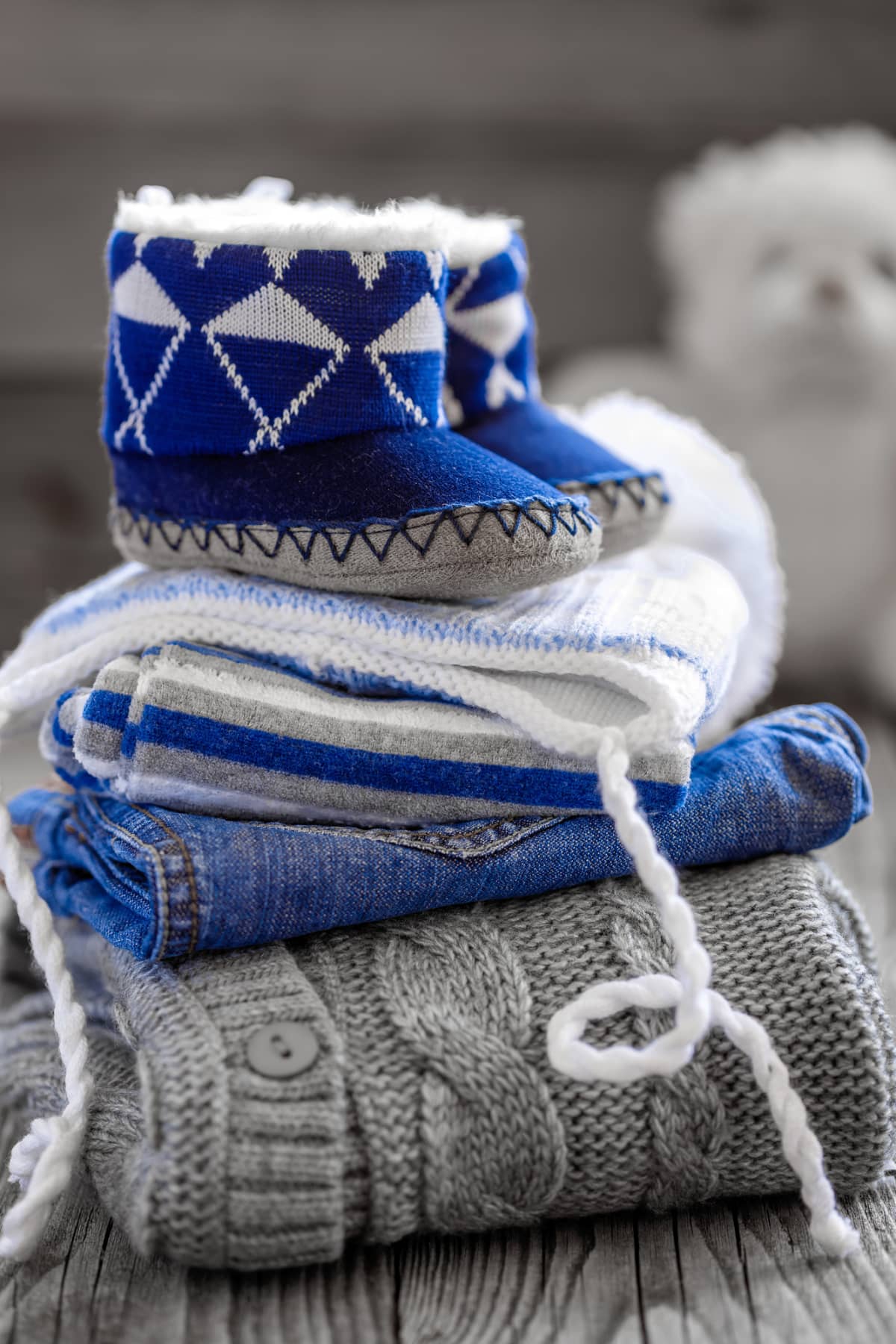
12. Pack an extra change of clothing for baby and you.
Of course, you will want to pack an extra change of clothes in your carry-on bag for your baby or toddler in case of an unfortunate leak or blow-out mid-flight. Tuck a couple of plastic bags in your diaper bag, too.
A friend of mine did exactly that when flying solo with her baby from California to Europe. Unfortunately, though, she did not pack additional clothing for herself. A leaky diaper left mama sticky and wet for the duration of her long flight. To avoid this inconvenience, toss a compact outfit for yourself into your travel bag, too.
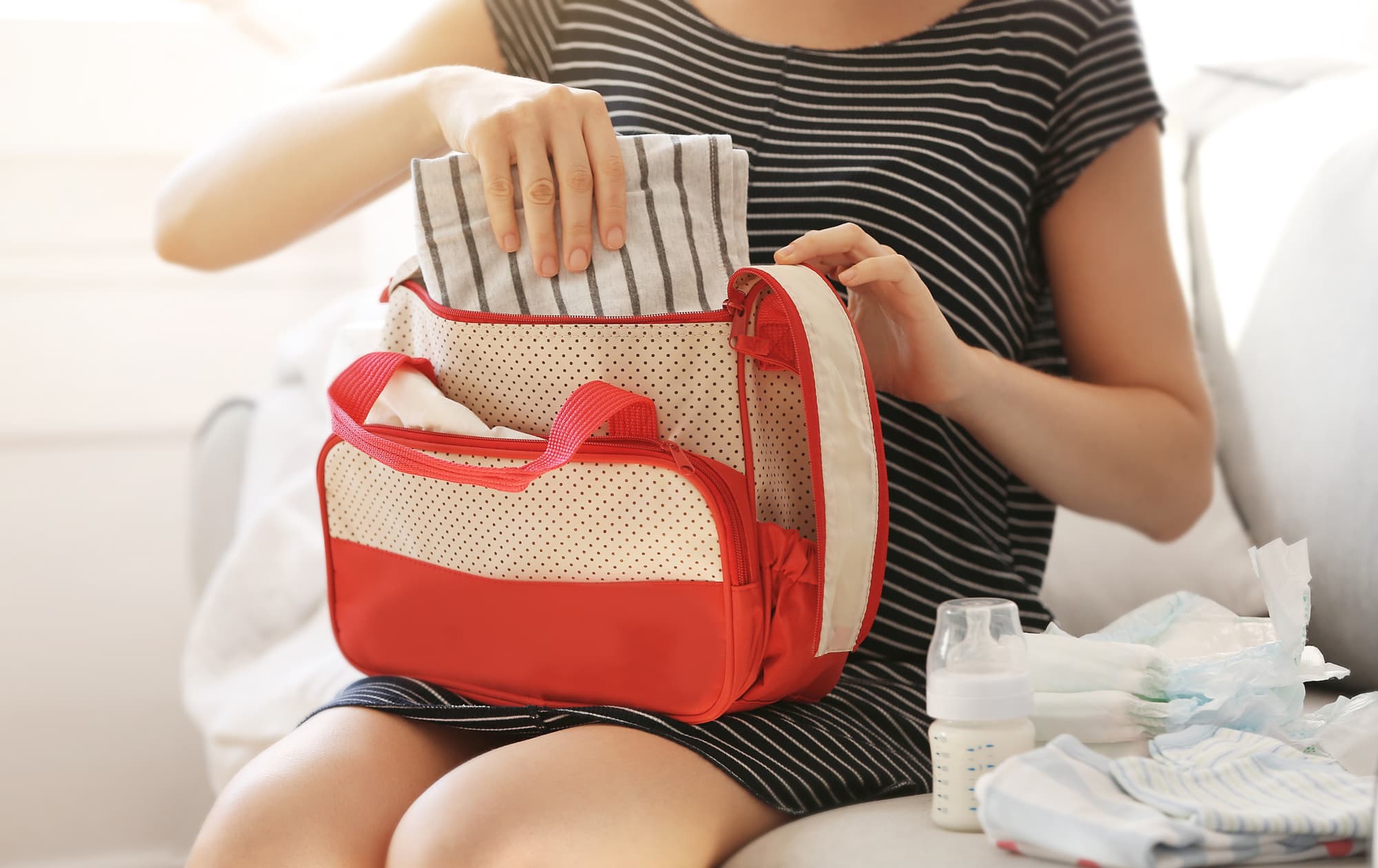
13. Protect your baby’s ears.
Sucking or chewing helps ease ear pain caused by pressure changes in the airplane’s cabin. Bring formula or pumped breast milk onboard. Then you can give your baby a bottle during take-off and landing while junior stays safely buckled.
Keep in mind that breast milk and baby formula is exempt from the 3.4 ounce liquid rule. For formula-fed babies, bring sealed liquid formula or buy a water bottle at the airport to mix with powdered formula.
If your child doesn’t take bottles, then a sippy cup or pacifier works, too. Chewing a cracker or cookie can also help older babies and toddlers.
EarPlanes are wonderful for flyers with sensitive ears. Pop these special plastic earplugs into little ears at the beginning of the airplane’s descent to lessen pressure and pain. Children’s EarPlanes work for kids aged 1+. You might also want to ask your pediatrician to prescribe ear pain drops before your flight with your baby.
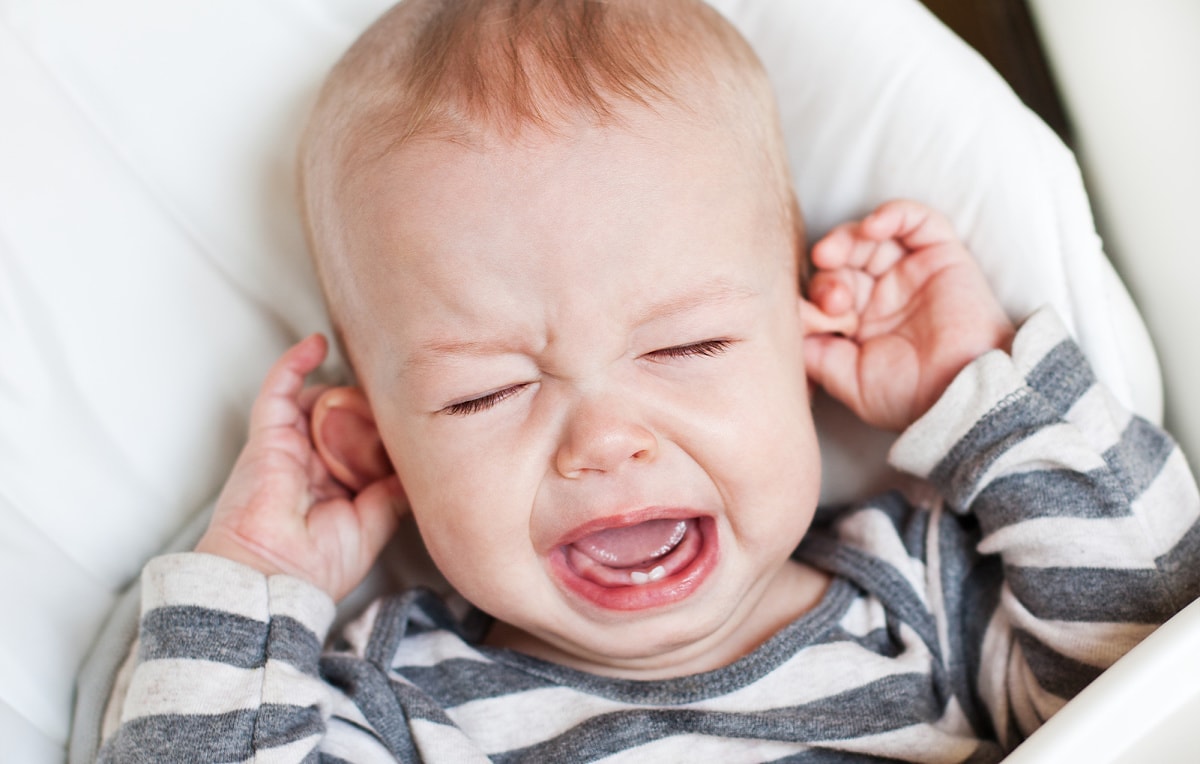
14. Don’t forget baby medication.
Make sure to pack any prescription and over-the-counter medicine you might need in your carry-on bag. Liquid medications are exempt from TSA liquid limits.
Be sure to keep them in their original packaging so they are easily identifiable. Infant ibuprofen can come in handy for sore ears and Dramamine for Kids is safe for children age 2+.
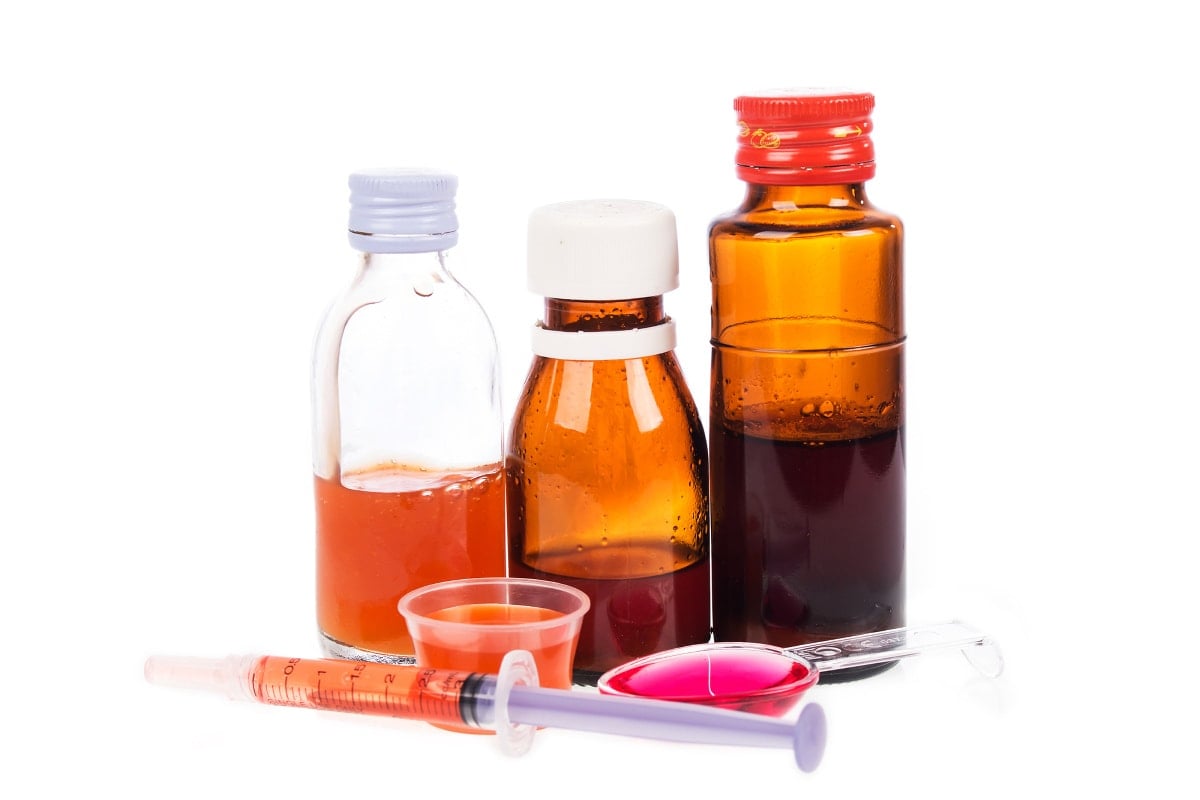
15. Focus only on your baby or toddler.
For now, the days of enjoying a magazine, good book, or action movie while onboard a plane are gone. You very well may spend your entire flight placating your baby or toddler. On a positive note, you just might find flying is the best time to concentrate on your baby without external distractions!
This means reading board books over and over and over to your little one. It means buying the right toddler travel toys and actively playing with your child. Maybe it also means spoiling your preschooler with smart device movies and apps, even if you avoid screen time at home.
The bottom line is, you need to keep that baby happy on the airplane using whatever means you can!
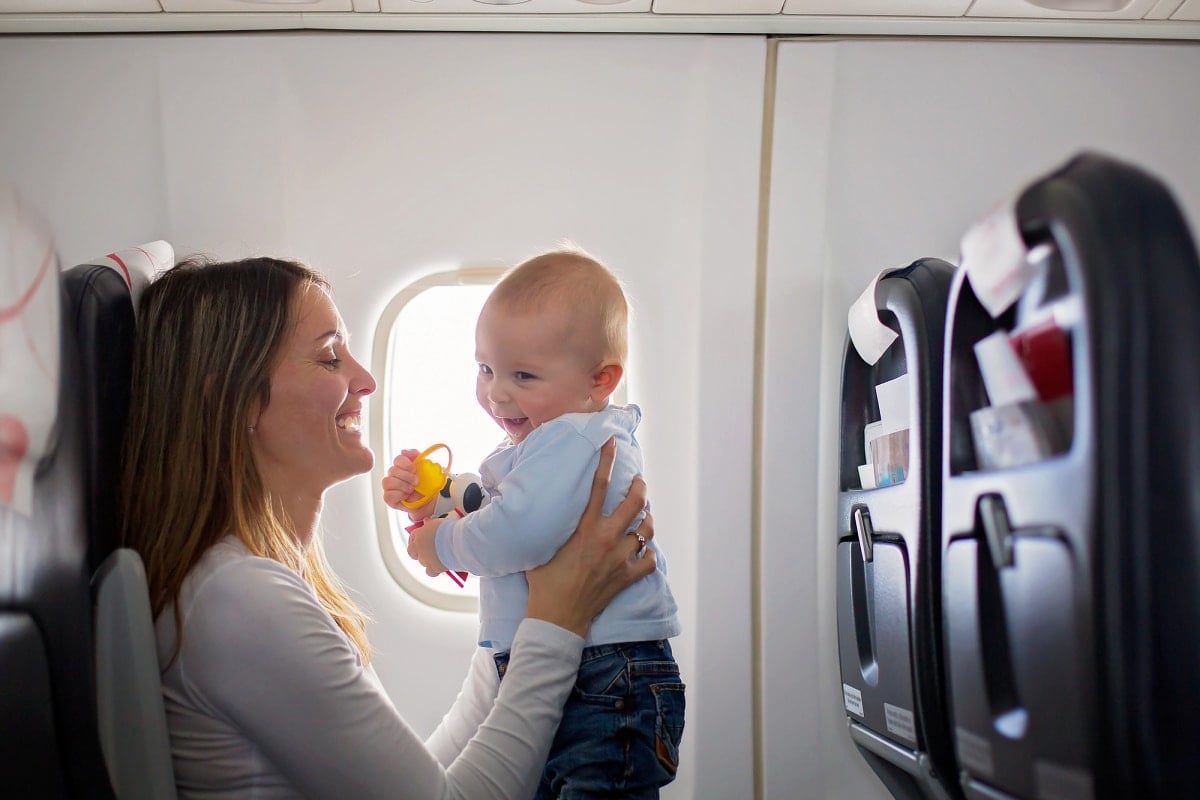
16. Pack smart for your flight.
There are so many things to remember to pack when traveling with young children. Before you leave home, print one of our free Family Travel Packing Lists. You definitely don’t want to forget that favorite toy or mommy’s smartphone charger!
Take a look at our Airplane Kit for Babies and Toddlers to see what to pack in your carry-on to keep your little one content in the air, too.
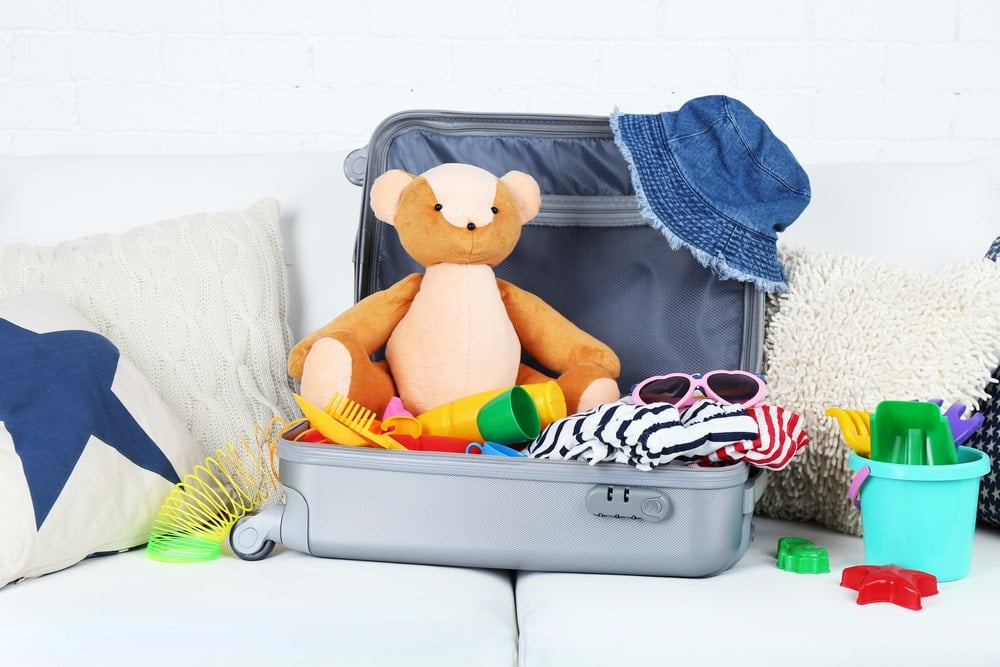
17. Seek out airport play areas.
Provide plenty of opportunities for little ones to play and expend energy prior to take-off. Many airports even offer play areas designed for young children. Check to see if your airport offers a playground here.
Plan to arrive at the airport a little early for playtime. Airport playgrounds also make a great diversion during layovers. Make sure to wash your child’s hands after playing.
With any luck, once you board, your child just might be so tuckered out that it will be nap time!
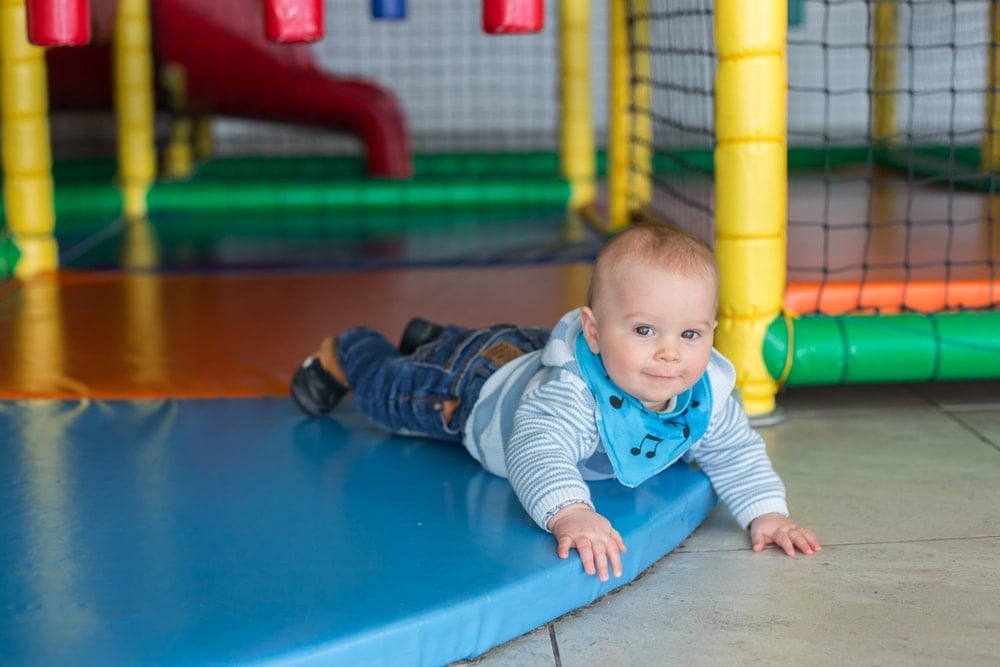
18. Avoid germs while flying.
Thankfully, airplane filtration systems are effective at removing airborne viruses, bacteria, and allergens from the air we passengers breathe while flying. The air that does not have a chance to run through the HEPA filter, however, can still make your family sick. Plus, the filters are only operational when the jets are on and the plane is in the air.
That’s why masks can still provide protection, especially when sitting on the jetway. You might want to mask up if you want to arrive at your destination without illness. Kid-sized masks for older children are a good idea, too.
Ever since my first flight with a baby, I have been bringing antibacterial wipes on airplanes with me. I always wipe down the armrests, seatbacks, and tray tables of my seat and my children’s seats.
You should also bring antibacterial gel onboard the plane. Lather up as needed before you eat or feed your child.
Bring along your own blankets, too. Those blue airplane blankets are rarely (if ever) washed. Eww!
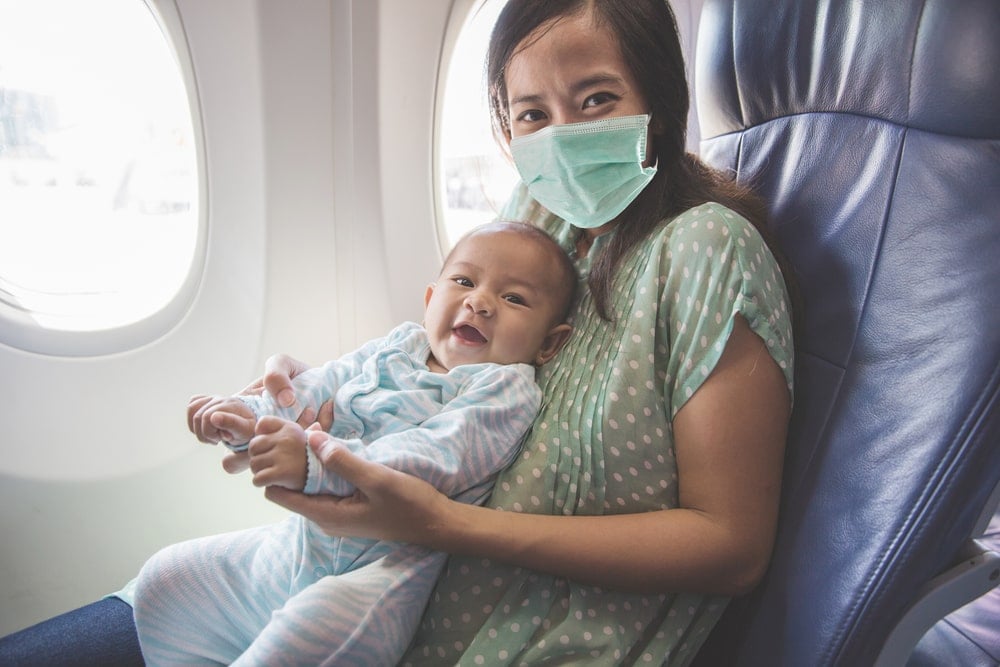
19. Book the right airplane seats.
You could always try an old trick to nab extra space when flying with a toddler or baby. When making your seat selection, book a window seat and an aisle seat in a row of three (or more), hoping no one books the middle seat. If your flight is not full and no one sits in the middle, you just may get extra space for your family.
The best way is to choose a row toward the back of the plane. That’s because passengers are more likely to book seats toward the front of the plane, middle or not.
Don’t count on this, though. Flights are often overbooked with zero empty seats available.
If the flight is fully booked, then you can always offer to switch seats with whoever is seated in the middle. Believe me, the person will be happy not to sit between you and your baby!
Although emergency exit rows are more spacious, keep in mind that children under 15 years of age are not allowed to sit there for safety reasons. Bulkhead seats are a better option and sometimes offer bassinets on international flights.
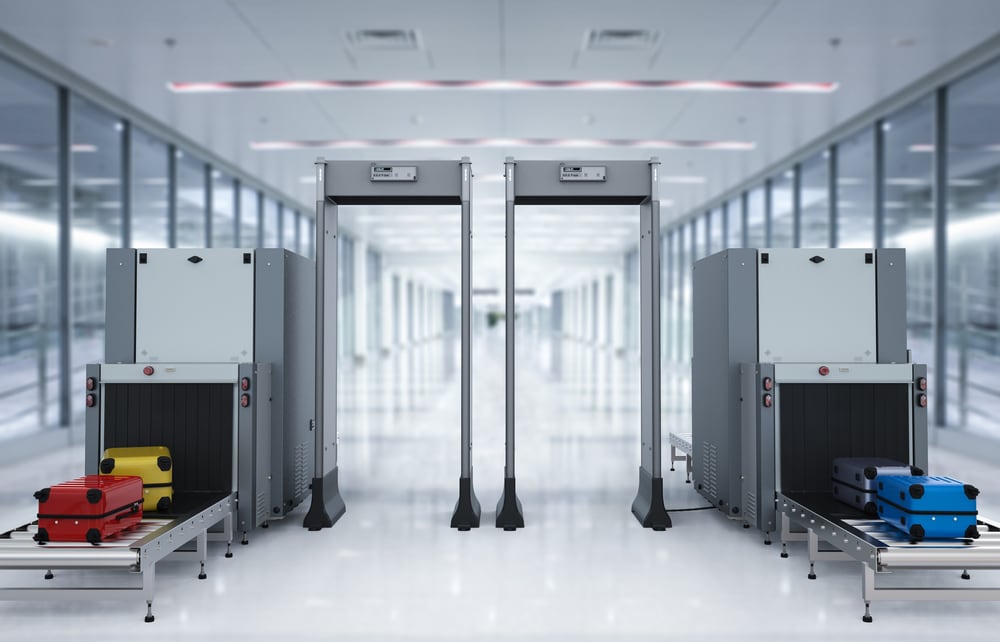
20. Prepare for airport security.
Airport security is one of the most stressful aspects of flying, especially with babies and toddlers.
Yes, even babies need to go through the full-body scanner or walk-through metal detector at the security checkpoint. Children too young to walk can be held.
If flying without both of the child’s parents, you may need a letter of consent. According to Notarize.com, “A notarized letter of consent will be required for children who travel without one or both of their parents or legal guardians. The letter of consent ensures the legitimacy of the travel consent offered by the accompanying adult.” When traveling solo with my kids, though, I have never been asked to provide this.
If embarking on an international flight, then you will need passports for everyone in the family including your baby. For domestic flights, you can bring along a birth certificate to show proof of age and parental relationship. Again, I have never needed to show this but it’s best to come prepared.
To get through the security line as smoothly as possible, follow these additional tips for airport security with kids.
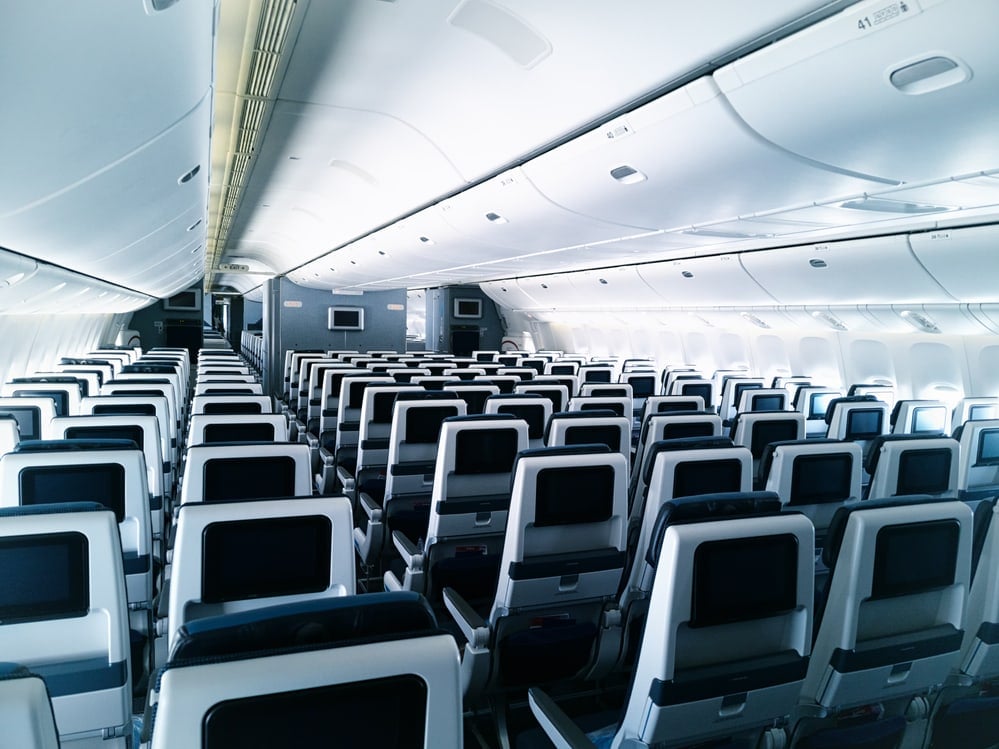
21. Ignore the haters.
Sometimes, no matter what you do, your baby or toddler is going to cry LOUDLY on the airplane. You can give bottles and snacks, try stories and movies, change diapers, and do everything on this list of tips for flying with babies and toddlers. Still, your child may have a screaming fit in the air.
The most important thing is that you try (and your fellow passengers witness that effort). You have enough to worry about without concerning yourself with all the cranky passengers on the airplane.
Take care of your baby or toddler, and ignore the haters. If all else fails, repeat this mantra, “This too shall pass!” Soon enough, your plane will land safely and your family will be ready to explore together.
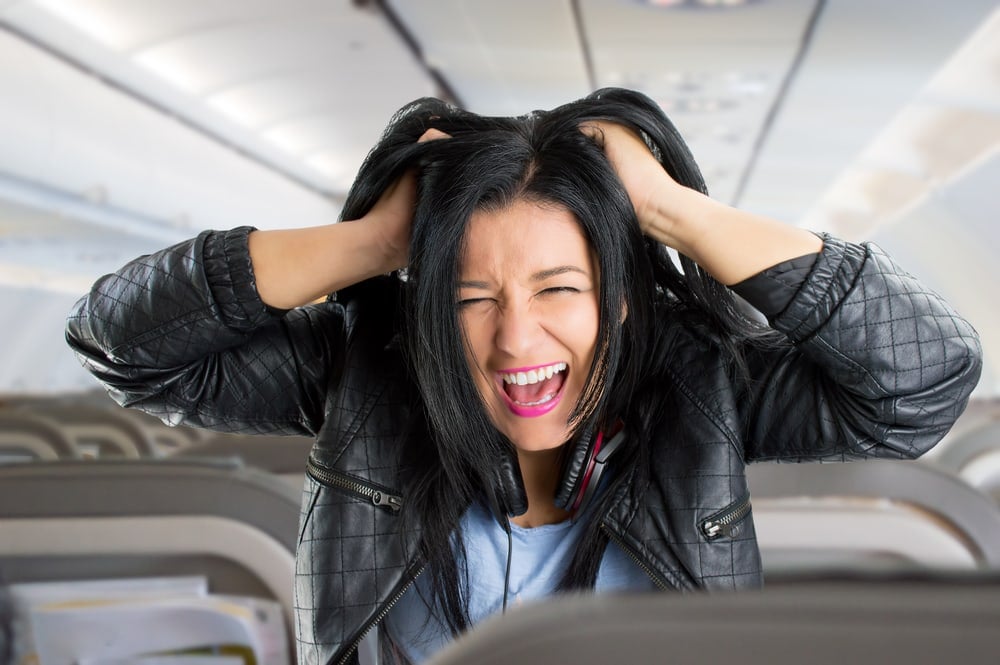
Why fly with babies and toddlers?
Flying provides easy access to an array of destination possibilities and certainly should not be avoided just because it may come with a few ups and downs. So book that flight and get ready to experience the world anew with infants, babies, and older toddlers!
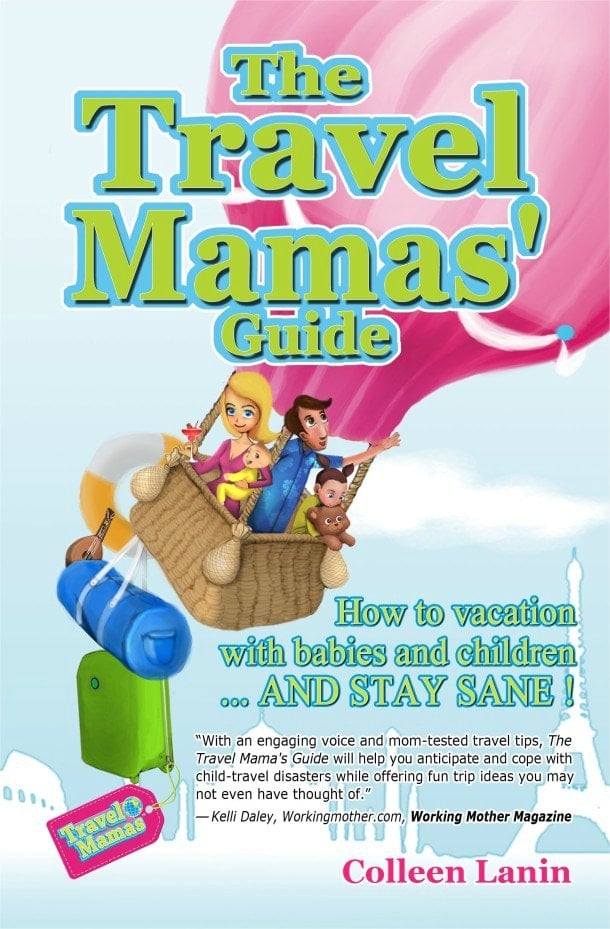
Learn more tips for traveling with young children.
For a whole slew of tips for traveling with babies, toddlers, and young children — buy my book!
Before your first flight with your little one, take a look at the best travel toys for babies and toddlers.
Considering a road trip? Read my tips for road trips with babies and toddlers.
To avoid lugging a bulky car seat onboard your next flight, read my review of CARES, a compact FAA-approved safety harness for toddlers and preschoolers.
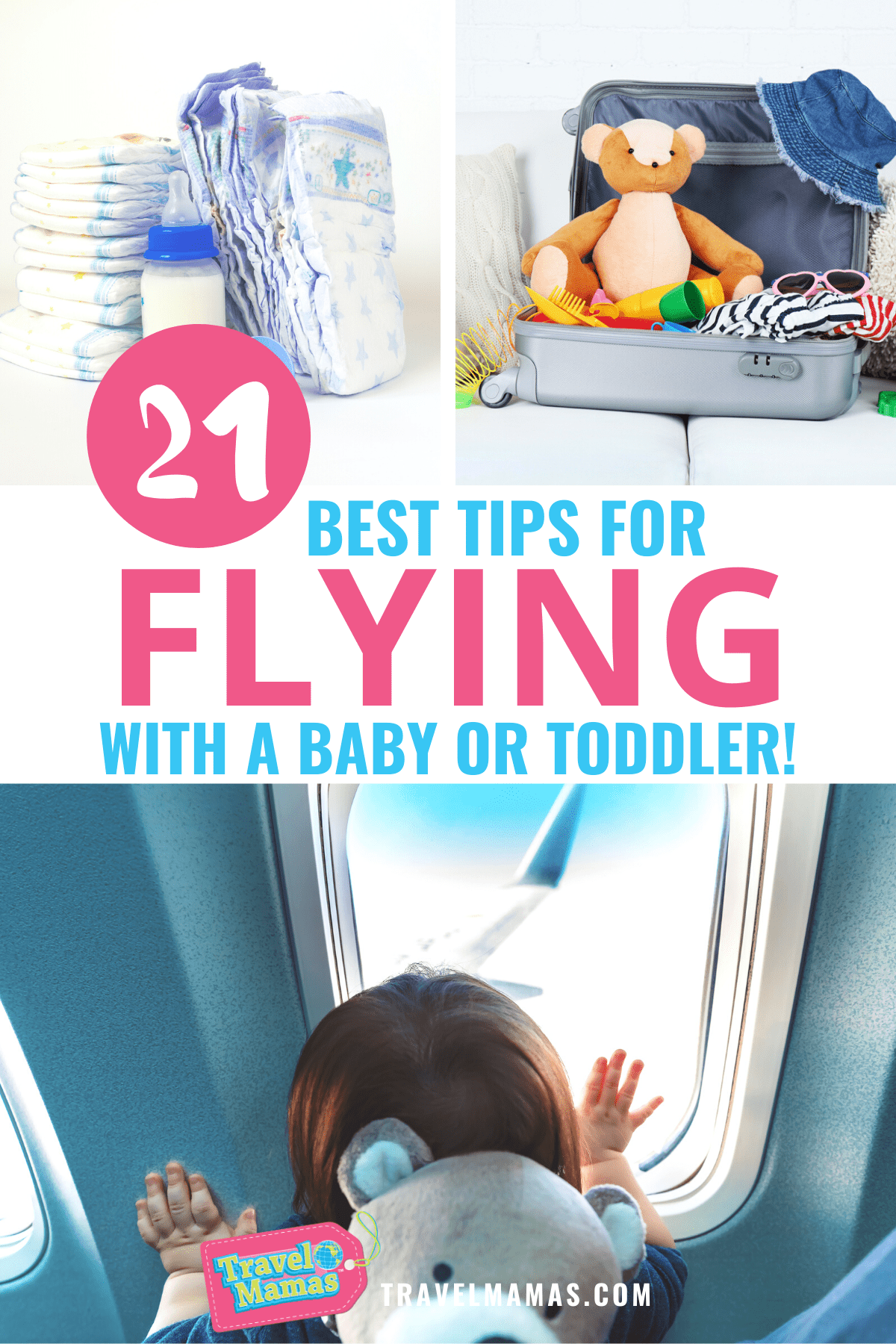
Save these airplane baby tips.
Be sure to save these tips for future reference. Just pin the graphic above to Pinterest. We hope you’ll follow Travel Mamas on Pinterest while you’re at it!
Do you have any questions or additional tips for flying with a baby or toddler? Let us know in the comments below!
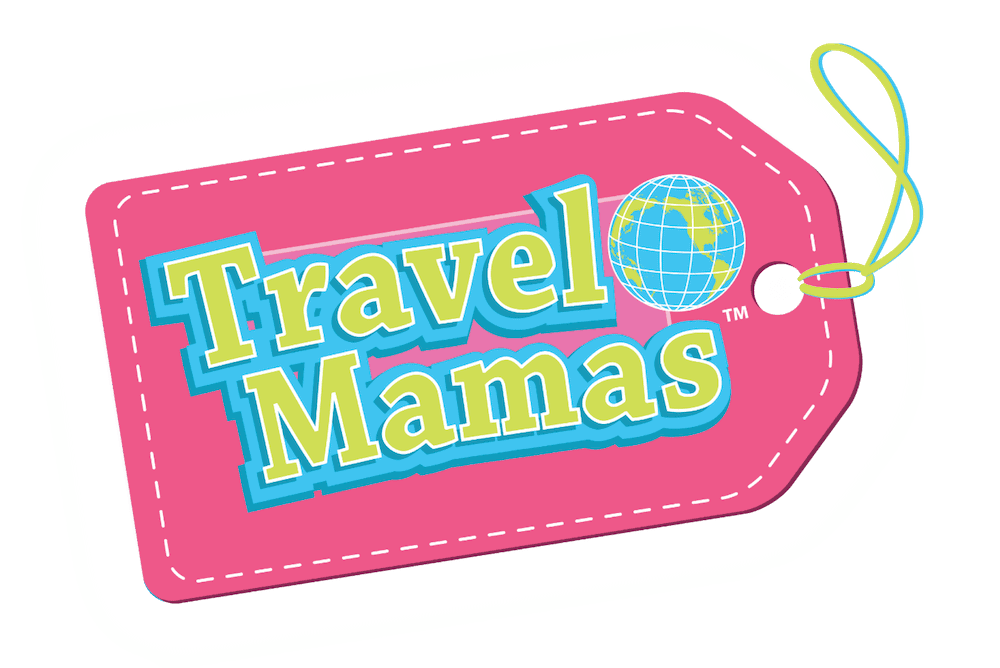


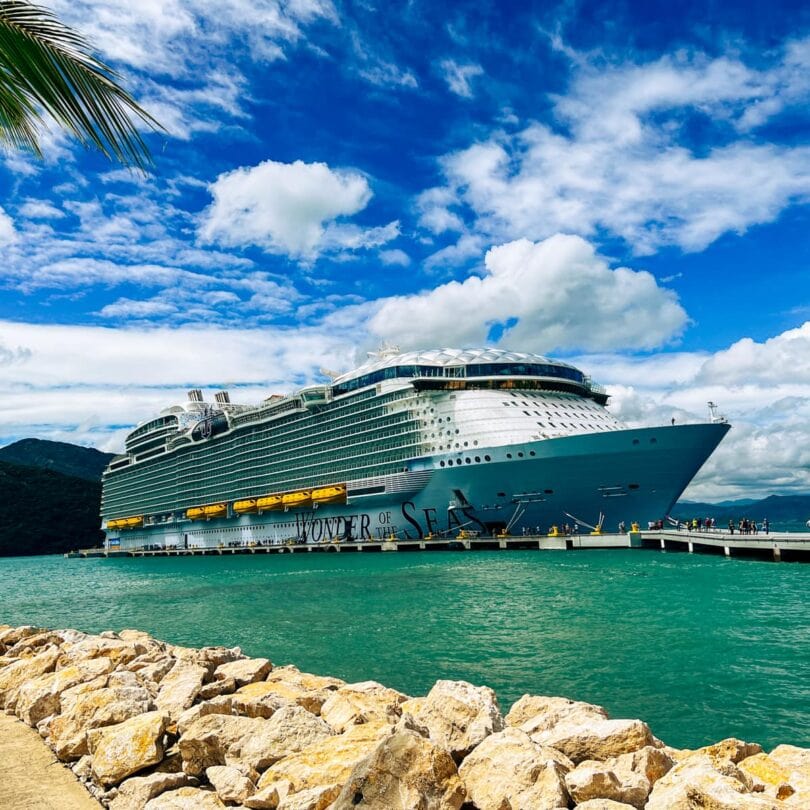




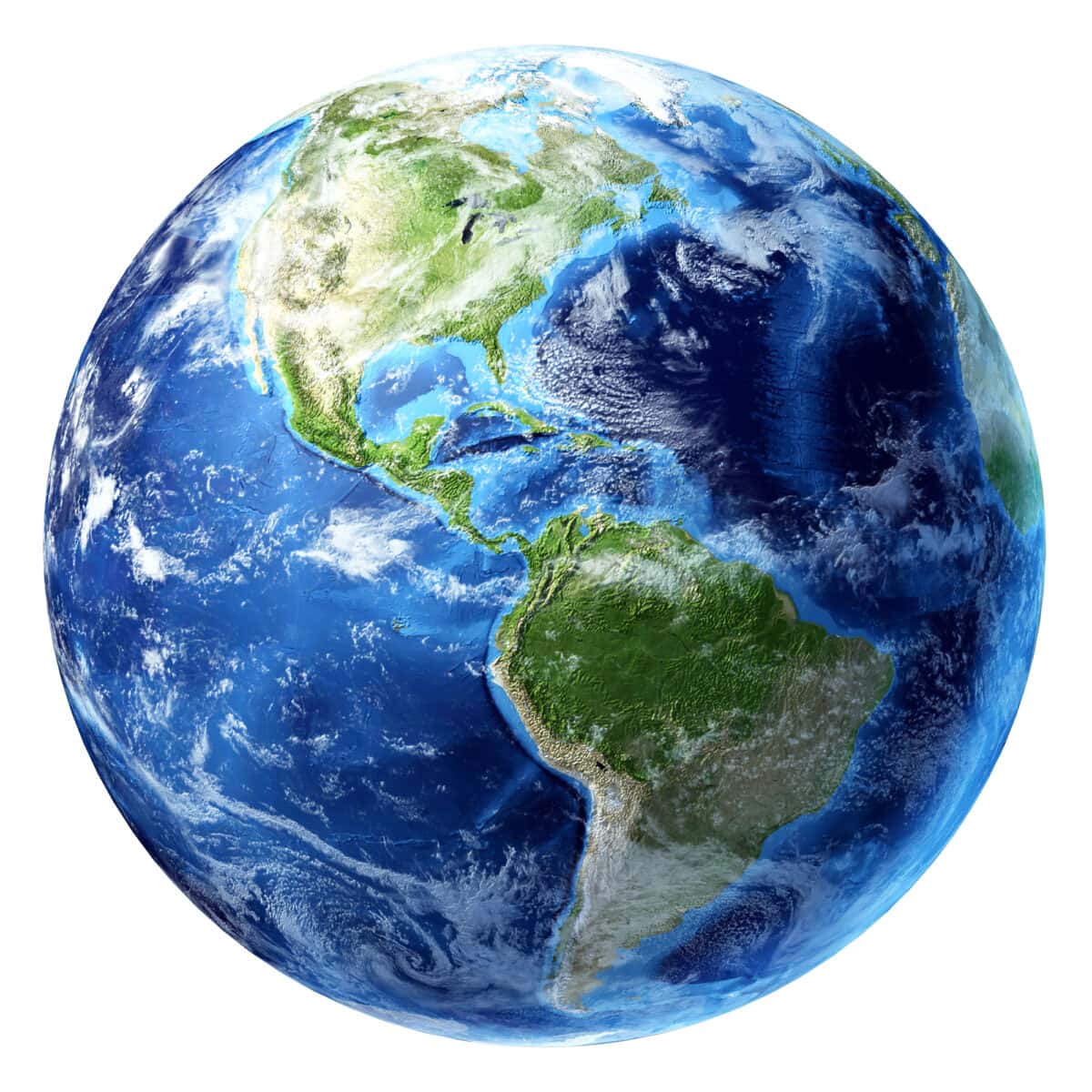


Trending Stories
50+ Best Things to Do in Scottsdale with Kids (2024)
10 Best Destinations in France to Visit with Kids
30 Best Hotels with Pools for Kids in the USA
25 Best Hotels with Lazy Rivers (Per Travel Experts)
21 Best Beach Resorts for Families (Around the World)
Royal Caribbean Mocktails: 12 Best Zero Proof Drinks at Sea